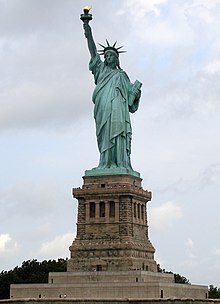
| This article is part of a series on |
| Conservatism in the United States |
|---|
 |
| History of the United States expansion and influence |
|---|
| Colonialism |
|
|
| Militarism |
|
|
| Foreign policy |
|
| Concepts |
American exceptionalism is the belief that the United States is either distinctive, unique, or exemplary compared to other nations.[1] Proponents argue that the values, political system, and historical development of the U.S. are unique in human history, often with the implication that it is both destined and entitled to play a distinct and positive role on the world stage.[2]
It originates in the observations and writings of French political scientist and historian Alexis de Tocqueville, most notably in his comparison of the United States with Great Britain and his native France. Tocqueville was the first writer to describe the country as "exceptional" following his travels there in 1831.[3] The earliest documented use of the specific term "American exceptionalism" is by American communists in intra-communist disputes in the late 1920s.[4]
Seymour Martin Lipset, a widely cited political scientist and sociologist, argues that the United States is exceptional in that it started from a revolutionary event. He therefore traces the origins of American exceptionalism to the American Revolution, from which the U.S. emerged as "the first new nation" with a distinct ideology, and having a unique mission to transform the world.[5] This ideology, which Lipset called "Americanism", but is often also referred to as "American exceptionalism", is based on liberty, individualism, republicanism, democracy, meritocracy, and laissez-faire economics; these principles are sometimes collectively referred to as "American exceptionalism".[6][7]
As a term in political science, American exceptionalism refers to the United States' status as a global outlier both in good and bad ways. Critics of the concept claim that the idea of American exceptionalism suggests that the US is better than other countries, has a superior culture, or has a unique mission to transform the planet and its inhabitants.[8]
American exceptionalism is a prominent feature of Mormonism. Mormons believe that America is the "promised land" that was settled by Lehi and his fellow Israelites.
- ^ Pease, Donald E. (June 27, 2018). "American Exceptionalism". Oxford Bibliographies. doi:10.1093/obo/9780199827251-0176. Archived from the original on June 27, 2022. Retrieved February 15, 2023.
- ^ Lipset, American Exceptionalism, p. 18.
- ^ de Tocqueville, Alexis. Democracy in America Archived September 30, 2024, at the Wayback Machine (1840), part 2, p. 36: "The position of the Americans is therefore quite exceptional, and it may be believed that no other democratic people will ever be placed in a similar one."
- ^ Cite error: The named reference
Zimmerwas invoked but never defined (see the help page). - ^ Seymour Martin Lipset, The first new nation (1963).
- ^ Lipset, American Exceptionalism, pp. 1, 17–19, 165–74, 197
- ^ Holmes, Kim. "Why American Exceptionalism Is Different From Other Countries' "Nationalisms"". The Heritage Foundation. Retrieved October 4, 2024.
- ^ Walt, Stephen M. "The Myth of American Exceptionalism." Archived September 11, 2021, at the Wayback Machine Foreign Policy (October 21, 2011)